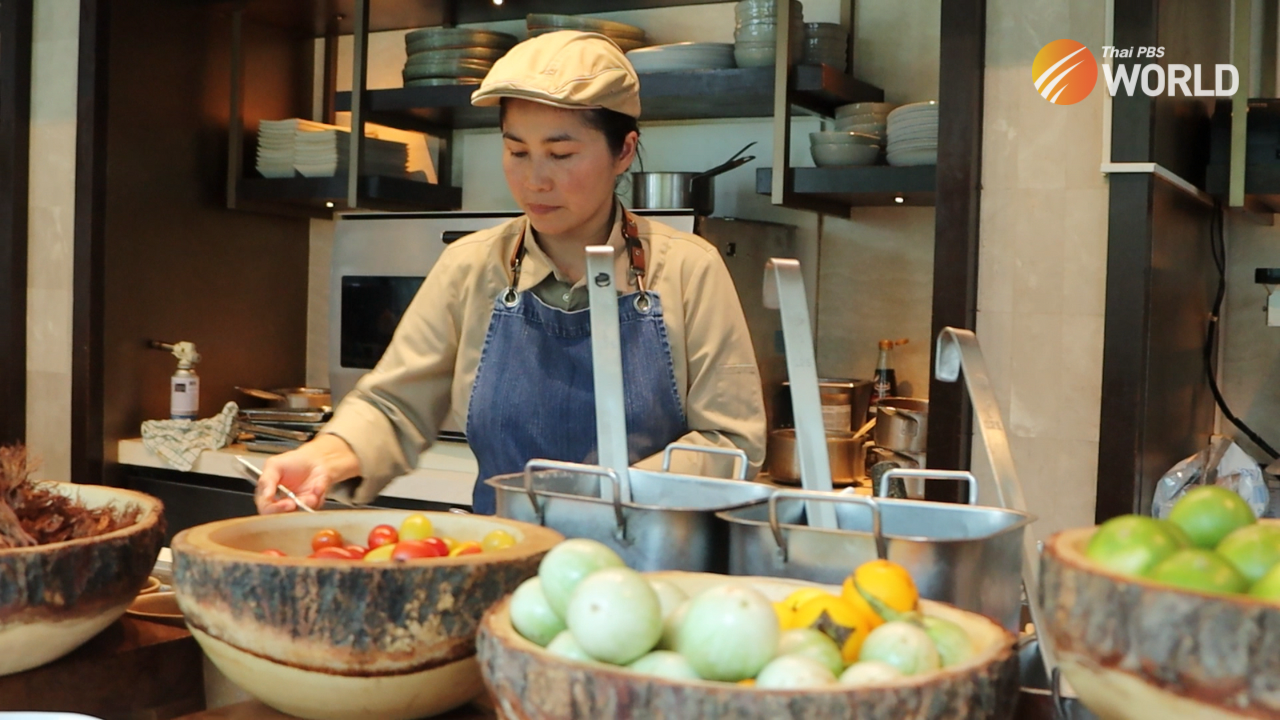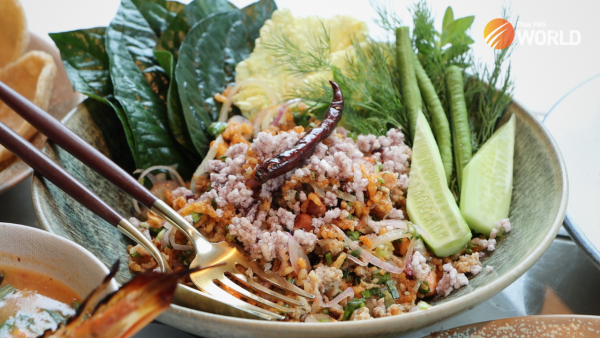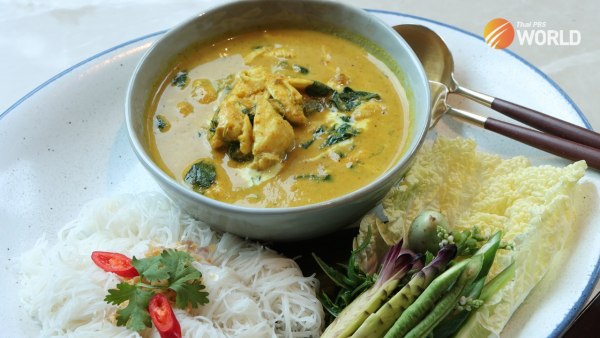Respect yourself enough to follow your dreams – Kannika Jitsangworn

“I think the charm of Thai food is its flavour. There’s always something different and it’s always new and fresh to you. It has all the flavours, from sour, sweet, salty and bitter to spicy and everything else, all in one dish. The dishes also depend on which region they are from.”
50 shades of Thai food
Southern Style yellow curry with crab meat, Isaan grilled fermented pork and crispy rice and wok-fried roasted pork belly with hot chili, these culturally-diverse dishes are being prepared by Chef Kannika Jitsangworn, reflecting her expertise and deep passion for Thai food.
Her culinary dreams began when she was young. Born and raised in Thailand’s Ratchaburi province, best known to tourists for its famous Damnoen Saduak floating market, Chef Kannika learnt how to cook traditional Thai food from her mother, when she saw her spending a lot of time in the kitchen.
Describing her house as situated “in the middle of a jungle”, her mother taught Kannika how to use local produce and ingredients from her village. Their favourite dishes to cook were Thai curries, especially spicy ‘jungle’ curry, red curry and the all-time-Thai-favourite green curry.
“We have almost everything, from lemongrass and lime to coconuts,” she explains. “Whenever my mother made curries, we had to pick coconuts, shell them, squeeze the coconut milk out and pound the flesh. We start everything from scratch and we don’t buy coconut milk or instant curry pastes from the shops.”

As much as Kannika loves to cook, her academic journey was completely different, as she studied political science at Ramkhamhaeng University. Kannika admitted, however, that she wasn’t sure what she wanted to pursue as her future career.
“There was a time where I wanted to become a local politician, that was why I took political science,” she said. “Then I realised that it wasn’t what I really wanted to do, so I shifted my focus to cooking.”
Later, one of her seniors at the university invited her to do casual work at a hotel. This was when she realised her passion, as she got to explore different aspects of Thai cuisine and hospitality. Eventually, Kannika decided to drop out of university, after she received a job offer to work as a chef overseas. That was when her culinary journey began.
Kannika has worked at several international chain hotels in many places around the world, from Langkawi in Malaysia, the Caribbean and Bali in Indonesia to Bhutan. Kannika was also a head chef at the super-luxurious resort in Phuket, Amanpuri, for five years, before joining as a Chef de Cuisine at Phra Nakhon restaurant, located in a luxurious riverside hotel, Capella Bangkok.
“I started cooking Thai food first but, when I moved to the Caribbean, they had a shared kitchen, so I got to do wellness type dishes and some Western food, such as salads. Then, one of the chefs approached me and asked me whether I wanted to be a Thai chef in Bali. I just accepted the offer and flew there, and I’ve been a Thai chef cooking Thai food ever since.”
Having explored the uniqueness of Thai food from different regions, if she had to choose a favourite, Kannika would choose the southern region of Thailand, as she fell in love with its hot and spicy food. Unsurprisingly, Southern style yellow curry with crab meat is one of her favourite dishes to cook, which is also among the signature dishes served at Phra Nakhon.
“I love southern Thai food,” she said. “Maybe because I had a chance to work at a resort in Phuket for five years, so I fell in love with their food, their people and everything. The food is really fresh, spicy and delicious. That’s what I really like the most.”

Lucky to be empowered
Having been a chef for more than 20 years, both in and outside Thailand, Kannika noticed how the roles of executive chefs have evolved, both in terms of gender and nationalities.
The Thai female chef de cuisine noticed that, in the old days, there weren’t many executive chefs working in large hotels who were Thai, as the position is often reserved for and dominated by foreigners. With Thai head chefs already rare in those days, becoming a head chef for Thai women was almost impossible.
On top of that, people used to believe being a chef was more suited to men, considering the heavy responsibilities and carrying heavy and hot items throughout the day. This may have discouraged women from pursuing such careers. Regardless, Kannika has seen positive changes in gender representation, including more Thai executive chefs being widely recognised in society.
“I think, during the past 10 years, there have been many more female chefs, not just in Thailand but around the world. There are more female head chefs in restaurants and in the food industry. Thailand has many famous female chefs, which makes me happy and I am proud of all women out there.”
Kannika also said that she has been very lucky to have been surrounded by head chefs who are women and who have empowered her to become the great chef she is today.
“The first executive chef I worked with was an Australian woman. She looked very cool to me and everyone respected her and followed her orders. This made me think to myself that I am a woman and one day I will become that kind of person. I don’t have to be an executive chef, but in a position like the one I have now is already okay for me.”
Even though Chef Kannika has fulfilled her culinary dream, there is one thing that she hopes to complete – her education, after dropping out of her studies almost two decades ago. At least, it will make her proud.
“I actually want to complete my studies. This will be my next step, because I think my career is already solid. I would like to have the very first university degree in my life.”
Meanwhile, Kannika also hopes to open a cooking school, teaching how to cook local Thai food to foreigners and Thais, if she retires from the industry. This, she hopes, will eventually create a new generation of aspiring cooks.
“I think I can continue this journey for quite some time but, let’s say I retire, I might open a cooking school for foreigners, or even Thais who are interested in cooking.”

Respect yourself enough to follow your dreams
As to how she would encourage other women, the Thai chef de cuisine would remind them to love and respect themselves enough to follow their dreams. Most importantly, they should not be discouraged from doing certain things, just because they are women.
“Don’t build a brick wall in your heart. Set your mind on your goals and tell yourself that you can do it.”
By Nad Bunnag, Thai PBS World






